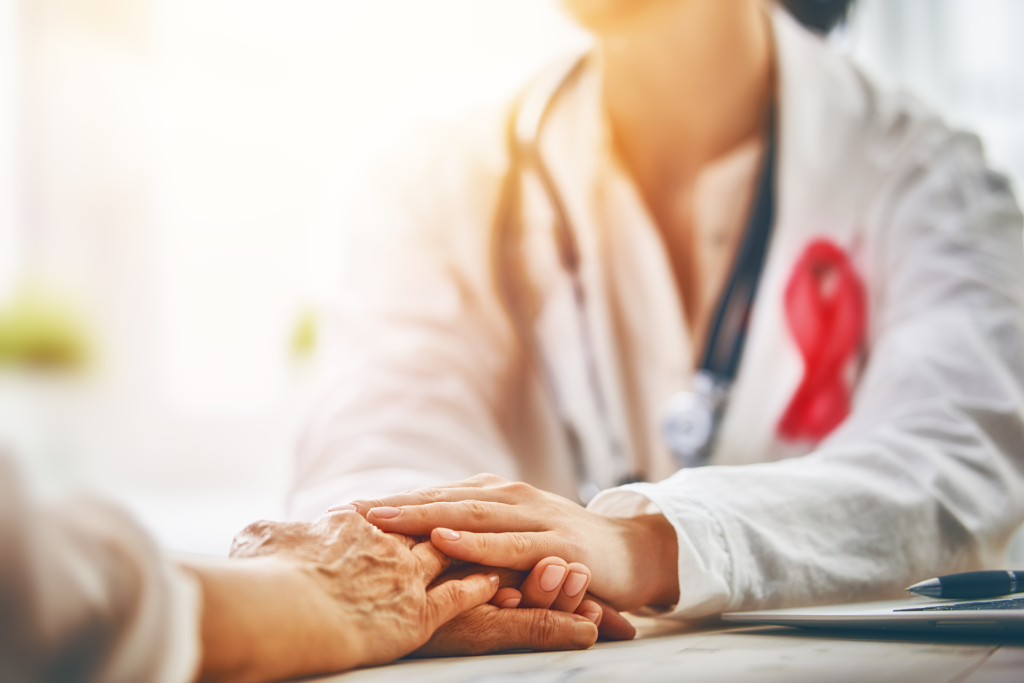When cancer touches your life, there is rarely a simple fix. Surviving cancer takes invasive treatment and turns your life around. It takes strength, consistent care, and luck to keep fighting. Cancer survivorship also takes a caring team. At Fairview Range, we offer an array of cancer services led by a team of compassionate experts who understand every cancer journey is different and every journey is difficult.
To highlight cancer survivorship and help those impacted by cancer, we worked with nurse practitioner Kimberly Pettinelli to answer often asked questions about cancer, survivorship, and support. For nine years, Kimberly Pettinelli, NP has worked in the oncology department, helping patients adjust treatment plans, manage side effects, provide treatment education, and perform survivorship and surveillance visits.
What cancer services does Fairview Range offer?
Fairview Range offers Medical Oncology, Radiation Oncology, Oncology Care Coordination, Social worker, Cancer Rehab services, Nutrition Services, Palliative Care and Hospice Services, and Survivorship Visits.
“It is a well rounded-program with services to help patients through any part of the cancer journey. The patient is at the center of all we do,” explains Pettinelli.
What does it mean to be a cancer survivor?
This applies to anyone who is currently fighting cancer, in remission, or cured. Cancer survivorship looks different for every person but every story is important. No cancer journey is easy.
“‘Surviving’ cancer can have different meanings to different people,” expands Pettinelli. “I see it as anyone diagnosed with cancer as they go through the trajectory from diagnosis to death.”
What is the difference between being cured of cancer and being in remission?
When your cancer has been cured, there is no evidence of it left after treatment and it should not return. When you’re in remission, it means the treatment has reduced the cancer partially or fully. Whether you’re in remission or have been cured, you will still need to conduct follow-up appointments with your provider.
After you’re in remission or cured, how often do you need to be seen?
Once cancer treatments are completed, surveillance appointments can be anywhere from 3 to 6 months to annually. These check-ins are to make sure the cancer has not come back or spread and to gauge the side effects of the cancer and treatment.
What is a cancer survivorship visit?
This is an appointment with a nurse practitioner to review your treatment summary and assess your overall wellness from physical to mental and help you navigate the impacts of cancer. It also maps out a plan for ongoing follow ups or surveillance.
What is a cancer surveillance visit?
This is when a patient is followed after treatment is completed, usually for at least 5 years.
What surprises people about surviving cancer?
“Long-term side effects can surprise people who have completed treatment or are going through treatments,” states Pettinelli. “Sometimes the fact that we recommend surveillance surprises people. They think once they are ‘done’ – they’re done. Also, I’ve seen many surprised by the strength they find going through treatment.”
Where can I find support as a cancer survivor?
No one should face cancer alone. Every day in your cancer journey you face new trials. There is support out there from people who understand what you’re going through. Online you can find support from around the world on Facebook groups like the Cancer Support Community and Cancer Support Group for Patients and Their Families. You can also find Facebook support groups for your specific type of cancer. The American Cancer Society also has a variety of support materials including a 24/7 cancer help hotline.
There are also a variety of virtual support classes available through M Health Fairview. Visit their website and reach out to the support group that’s right for you.
How can I support a friend or family member who is a cancer survivor?
Acknowledge the cancer and the challenges that come with it. Some people feel like they can’t bring it up because it is such a hard topic. This only leads to cancer patients feeling isolated. You can’t ignore cancer. Therefore, be open and honest with your questions and be there to listen. Look for ways you can help them whether it is running errands or driving them to appointments if they need it. Your friend or family member will appreciate your effort.
“Acknowledging those that have gone through and are going through the cancer journey can show support for these individuals,” explains Pettinelli. “It can shed a different light on the taboo word ‘Cancer,’ showing that many have survived cancer whether it be completing treatment or continuing treatment to keep cancer at bay.”
Cancer treatment. Cancer support.
Whether you have just been diagnosed with cancer or in remission, our cancer care teams at Fairview Range are here for you. We understand the hurdles you face and do everything in our abilities to improve your cancer survivorship journey.
“I see patients ‘survive’ cancer every day. No matter where they are in their journey, whether in treatment for active cancer or in surveillance, it’s amazing to be able to work with these individuals and see their strengths and be a part of such a huge life changing experience,” says Pettinelli. “I am in awe every day.”

